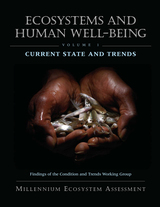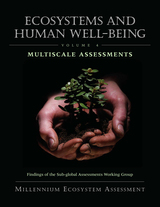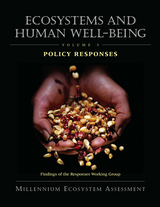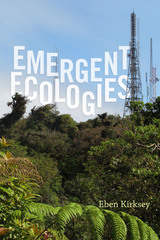4 books about Ecological assessment (Biology)

Ecosystems and Human Well-Being
Current State and Trends: Findings of the Condition and Trends Working Group
Millennium Ecosystem Assessment
Island Press, 2005
Humans have changed ecosystems more rapidly and extensively in the last 50 years than in any comparable period of human history. We have done this to meet the growing demands for food, fresh water, timber, fiber, and fuel. While changes to ecosystems have enhanced the well-being of billions of people, they have also caused a substantial and largely irreversible loss in diversity of life on Earth, and have strained the capacity of ecosystems to continue providing critical services.
Among the findings:
Approximately 60% of the services that support life on Earth are being degraded or used unsustainably. The harmful consequences of this degradation could grow significantly worse in the next 50 years.
Only four ecosystem services have been enhanced in the last 50 years: crops, livestock, aquaculture, and the sequestration of carbon.
The capacity of ecosystems to neutralize pollutants, protect us from natural disasters, and control the outbreaks of pests and diseases is declining significantly.
Terrestrial and freshwater systems are reaching the limits of their ability to absorb nitrogen.
Harvesting of fish and other resources from coastal and marine systems is compromising their ability to deliver food in the future.
Richly illustrated with maps and graphs, Current State and Trends presents an assessment of Earth's ability to provide twenty-four distinct services essential to human well-being. These include food, fiber, and other materials; the regulation of the climate and fresh water systems; underlying support systems such as nutrient cycling; and the fulfillment of cultural, spiritual, and aesthetic values. The volume pays particular attention to the current health of key ecosystems, including inland waters, forests, oceans, croplands, and dryland systems, among others. It will be an indispensable reference for scientists, environmentalists, agency professionals, and students.
[more]

Ecosystems and Human Well-Being
Multiscale Assessments: Findings of the Sub-Global Assessments Working Group
Millennium Ecosystem Assessment
Island Press, 2005
One of the major innovations of the Millennium Ecosystem Assessment is the incorporation of local and regional assessmentsù33 in allùin a global portrait of the planetÆs health. It is the first global assessment of ecosystems to include not only a diversity of ecosystems, but to draw on a wide range of cultural orientations and intellectual traditions, including those of indigenous peoples.
The Sub-global Assessments Working Group integrated information from multiple sources and found that biophysical factors such as land-use change, climate change and variability, pollution, and invasive species have a significant effect on human well-being across cultures. For example, in places where there are no other social safety nets, diminished human well-being tends to increase immediate dependence on ecosystem services, which can damage the capacity of those local ecosystems, which in turn appears to increase the probability of natural disaster or conflict.
Representing the baseline and framework for ongoing assessments of ecosystem and human well-being on a variety of scales around the world, Multiscale Assessments provides students, researchers, and policy-makers with the most comprehensive methodology for assessing ecosystems at local, national, and regional scales.
[more]

Ecosystems and Human Well-Being
Policy Responses: Findings of the Responses Working Group
Millennium Ecosystem Assessment
Island Press, 2005
With the knowledge of possible outcomes, what kind of actions should we take? The Millennium Ecosystem Assessment scored 74 response options for dealing with declines in ecosystem services and biodiversity, and managing drivers such as climate change and nutrient loading. This third volume in the MA series analyzes the track record of past policies and the potential of new ones.
The challenge of reversing the degradation of ecosystems while meeting increasing demands for their services can be met only with significant policy and institutional changes. However, a difficult set of obstacles stand in the way. Policy makers must keep in mind that there are both trade-offs and synergies between human well-being, ecosystems, and ecosystem services, and that decisions regarding these tradeoffs are difficult and often contentious. The Responses volume ultimately establishes which policy options have the greatest chance to overcome the obstacles and generate positive outcomes. It will serve as an invaluable guide to the creation of stronger policy frameworks for the future.
[more]

Emergent Ecologies
Eben Kirksey
Duke University Press, 2015
In an era of global warming, natural disasters, endangered species, and devastating pollution, contemporary writing on the environment largely focuses on doomsday scenarios. Eben Kirksey suggests we reject such apocalyptic thinking and instead find possibilities in the wreckage of ongoing disasters, as symbiotic associations of opportunistic plants, animals, and microbes are flourishing in unexpected places. Emergent Ecologies uses artwork and contemporary philosophy to illustrate hopeful opportunities and reframe key problems in conservation biology such as invasive species, extinction, environmental management, and reforestation. Following the flight of capital and nomadic forms of life—through fragmented landscapes of Panama, Costa Rica, and the United States—Kirksey explores how chance encounters, historical accidents, and parasitic invasions have shaped present and future multispecies communities. New generations of thinkers and tinkerers are learning how to care for emergent ecological assemblages—involving frogs, fungal pathogens, ants, monkeys, people, and plants—by seeding them, nurturing them, protecting them, and ultimately letting go.
[more]
READERS
Browse our collection.
PUBLISHERS
See BiblioVault's publisher services.
STUDENT SERVICES
Files for college accessibility offices.
UChicago Accessibility Resources
home | accessibility | search | about | contact us
BiblioVault ® 2001 - 2024
The University of Chicago Press









